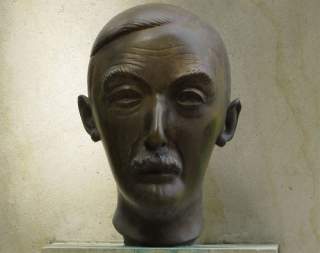The Mysterious World of Stefan Zweig
The turbulent life of the popular Austrian novelist who escaped the Nazis—but could not escape himself.
The gilded trellises of this peculiar sanctuary were very thick, depriving the inmates of every view and every insight that could disturb their enjoyment. Not once does Zweig mention the most ominous manifestation of the years after the First World War, which struck his native Austria more violently than any other European country: unemployment.
This is the critique of Zweig as the grand seigneur, oblivious to the dangerous currents swirling beneath that would hurl him and his brethren into the cataract of history. According to Prochnik, “Zweig set himself up for such attacks by virtue of having been, undeniably, an awfully wealthy man who preferred the company of established great artists and ardent young male poets to just about anyone.”
Prochnik goes on to defend Zweig. He observes that Zweig does cite unemployment in his memoirs as a reason for Hitler’s rise. Zweig, together with his first wife Friderike, had established education courses for workers living in Salzburg. His solution to the woes of the time was education. According to Prochnik, Zweig believed that “school curricula might be turned away from their focus on political and military history, toward a program of cultural enlightenment that would elucidate the shared efforts of European peoples to create a ‘great and wonderful spiritual edifice.’” Of course, these exalted aspirations remain almost as elusive today as they were then.
STILL, PROCHNIK’S supple defense of Zweig may not even be entirely necessary. For one thing, Arendt’s critique assumes that Nazism was inevitable. It’s easy enough to say in hindsight that Jews in Austria or Germany were blind to the looming peril, but they weren’t endowed with political clairvoyance. There was no guarantee that Hitler would come to power and, indeed, had the German elite resisted him in January 1933, he most likely would have become a spent force. The criticism also makes the assumption that a writer has a moral obligation to take a political stand, to act as a kind of Praeceptor Germaniae. It envisions Germany as the land of Dichter und Denker, the poets and thinkers.
This romantic belief—the fusion of spirit and power—lingers on in Germany today, where authors on the right (Martin Walser) or left (Günter Grass) periodically issue their addresses to the German nation. But it’s not clear that these interventions have ever been all that instructive or profitable. In fact, the record of German intellectuals, at least when it comes to political pronouncements, is pretty dismal. Stefan George started his own authoritarian cult. Bertolt Brecht, cynical and opportunistic, embraced, or pretended to embrace, Communism, setting up shop in East Germany. Martin Heidegger supported the Nazi movement during its early days. And Thomas Mann espoused anti-Western sentiments during World War I in his murky Reflections of an Unpolitical Man, which appeared to posit a German spirit superior to that of the decadent and corrupt West—though Mann, of course, became a foe of the Nazis and effectively repudiated his earlier work.
In moving to Brazil, Zweig appears to have tried to say goodbye to all that, to recuse himself from a world seemingly intent on self-destruction. Like Austria, it was a polyglot country, but here, so Zweig thought, everyone seemed to mingle peacefully, in contrast to the bloody ethnic quarrels of Central Europe. He even wrote one last book, a tribute to his hosts, called Country of the Future. But Zweig clearly didn’t believe that he had a future, here or anywhere else. Soon he divested himself of his remaining belongings. In February 1942, he created a bonfire in his garden and consigned his papers to the flames. Then came the doses of Veronal and a farewell letter: “I think it better to conclude in good time and in erect bearing a life in which intellectual labor meant the purest joy and personal freedom the highest good on earth.” Flower-bedecked coffins were carried through town. Petropolis shut down for the day. Zweig could only ask, like the disconsolate Franz Ferdinand Trotta in Roth’s final novel The Emperor’s Tomb, “Where can I go now, I, a Trotta?” It was a question that the possessor of Goethe’s pen was unable to answer.
Jacob Heilbrunn is editor of The National Interest.
Image: Wikimedia Commons/aconcagua. CC BY-SA 3.0.

